Most Ticket Prices Increase & Park-Specific Pricing Debuts at Disney World
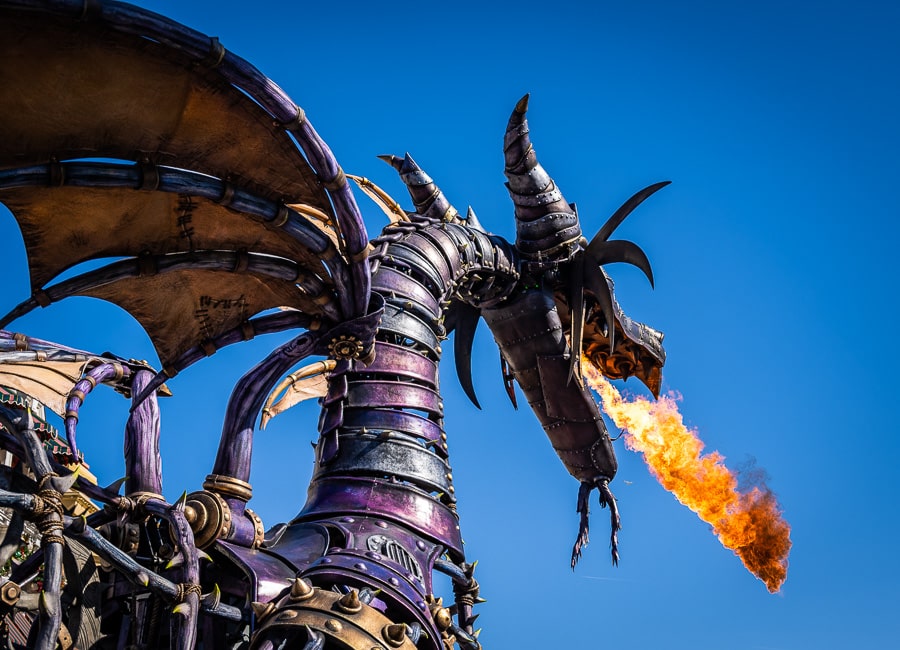
Walt Disney World has raised almost all prices for 1-day and multi-day tickets, plus Park Hopper add-ons, and introduced per-park pricing while eliminating Park Pass reservations for single-day tickets. This post offers details and our commentary about all of these changes, the amount of cost jumps, motivations for the new approach, and more. (Updated December 18, 2022.)
This is the second ticket price increase of the year at Walt Disney World, with the first happening in mid-February. This isn’t entirely unprecedented, as Disney has raised prices twice annually (usually in February and October) on a few occasions in the last decade. That’s why we’ve been advising readers to purchase tickets in advance to lock-in current prices in our 2022-2023 Discount Walt Disney World Ticket Buying Guide.
If this seems like the third or fourth price increase of the year, that might be because there have been a lot of price increases at Walt Disney World since the start of the fiscal year. The big ones were to hundreds of menu items all around the parks & resorts and a new (mostly more expensive) date-based pricing for the Genie+ service. That second one is essentially an indirect means of raising the cost of admission, as Genie+ used to be included (as FastPass) with all tickets.

There’s also the fact that Walt Disney World announced this particular price increase in November, and indicated it would take effect on December 8. Not all of the details were known then, so we have a better idea of how bad the ‘damage’ of this price increase is now that it’s actually been implemented.
Before we dig into the details, the good news is that Undercover Tourist still has tickets at the “old” prices for a limited time (these are still available as of December 18, 2022). By buying through them before they run out of inventory of the pre-price increase tickets, you can save a significant amount per ticket.Undercover Tourist is a third party ticket seller that we recommend, one of the few that is authorized by Walt Disney World and provides legitimate discounted tickets. They are completely safe, their customer service is great, and the prices are definitely right–up to $173 off!
Anyway, here’s which ticket prices have gone up…
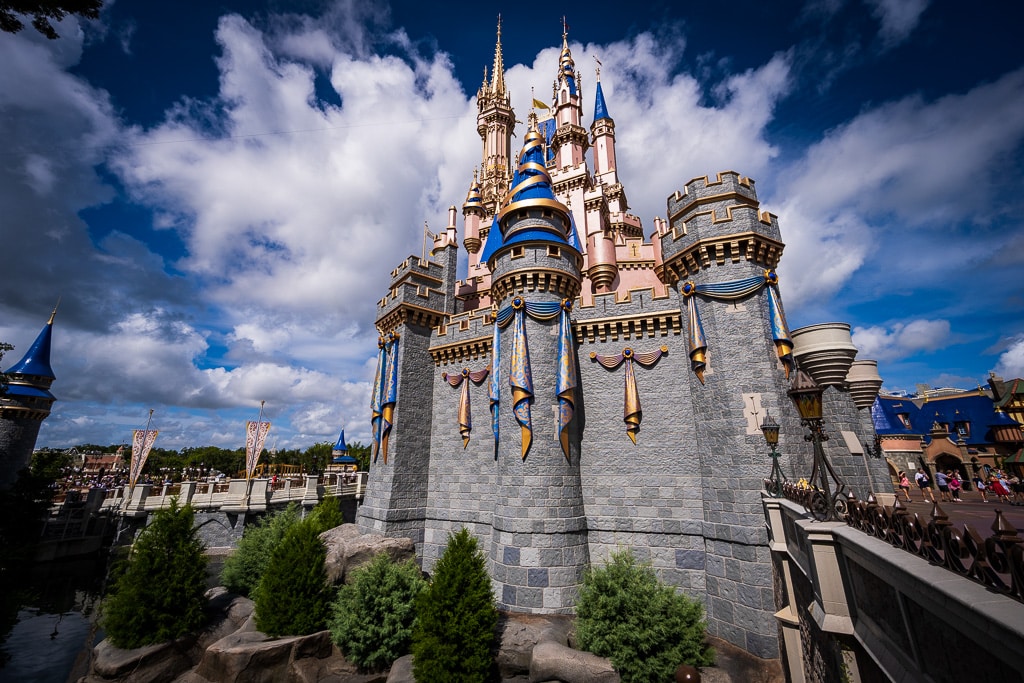
For the first time in several years, the cost of 1-day tickets has gone up. These still start at $109–but only for Animal Kingdom–which has been the base price since the introduction of the date-based system back in October 2018. However, the maximum 1-day ticket price has skyrocketed for Magic Kingdom, which is the first time that’s happening since March 2019.
Maintaining this $109 starting price is an interesting decision, and it seems like an important talking point for Disney. When costs of visiting are discussed in the mainstream media, there’s typically a quote from a Disney spokesperson reiterating that the base price has not gone up in ~4 years. That’s technically true, but the practical reality is that 95% of tickets actually cost more. That is, unless you are only visiting Animal Kingdom for one day during the off-season. Our guess is that 1-day tickets to DAK don’t account for a tremendous amount of ticket sales, so the ‘static base price’ talking point is largely BS.
Speaking of which, Disney also touts the maximum “flexibility” and “customizability” of tickets, as guests can choose to visit on less expensive days and save. (Tell that to teachers or families with school age children! Good thing neither group are among Disney’s key consumers. Oh wait…)
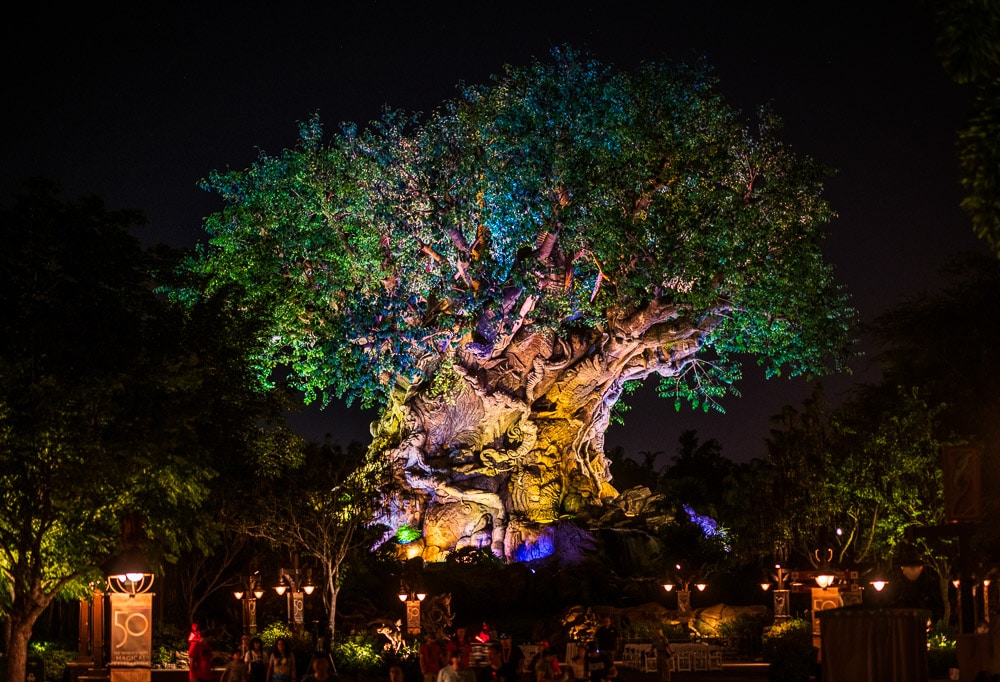
On that note, there are a couple caveats. First, we now that there’s been a decrease in $109 price point tickets during that time. We don’t track the date-based calendar zealously, but it’s clear from even a cursory comparison between now and ~2018 that there are far, far fewer lower-priced days this year than then. With each change, there has been a shrinking number of cheaper dates and growing number of more expensive dates.
Second, maintaining that $109 starting price (again, only for Animal Kingdom) leads to odd outcomes as all other tickets increase without regard for that marketing decision. To that point, it’s now cheaper to buy two single-day tickets for Animal Kingdom than one 2-day ticket during off-season dates. This is noteworthy because Walt Disney World’s motto with longer visits used to be: “the more you play, the less you pay per day.”

With that out of the way, below are the new park-specific pricing for single day, single park tickets. Price ranges are as follows:
- Magic Kingdom – $124 to $189
- Animal Kingdom – $109 to $159
- Disney’s Hollywood Studios – $124 to $179
- EPCOT – $114 to $179
As before, ticket prices will vary based on dates, hence the ranges. Here’s a look at a more popular date during the 2023 Christmas season:
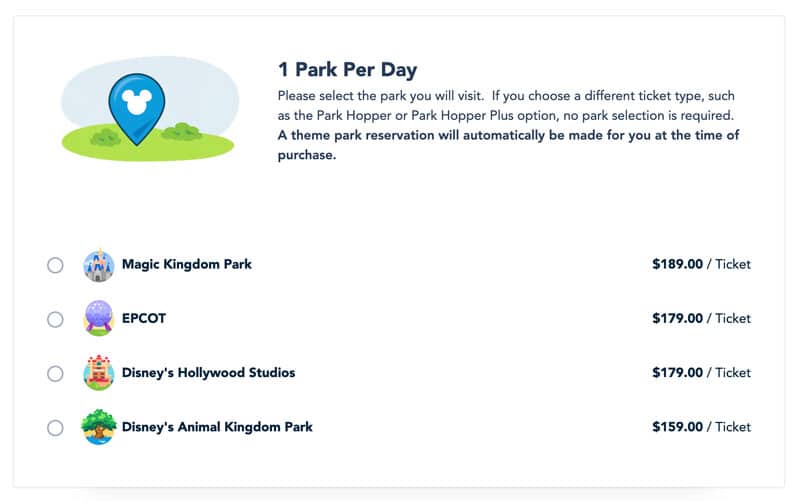
This is not dynamic or “surge” pricing, but it is demand-based in the sense that dates forecast to be busier also cost more.
Even for dates over a year away in December 2023, Walt Disney World already knows that attendance and organic demand will be higher than in September 2023. Years of historical data provide a good basis for pricing and resource allocation.
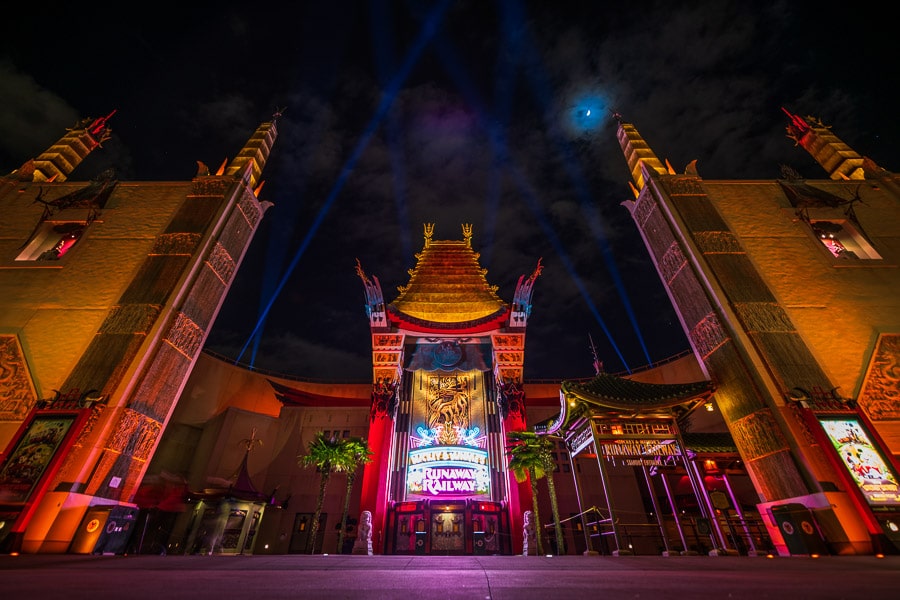
Park reservations are also no longer necessary for single day, non-Park Hopper tickets. With these being park-specific, that would be redundant. According to Walt Disney World, this technically works by the system automatically making a reservation for you. The end result is the same for guests–no reservations needed for 1-day, 1-park tickets.
For now, guests with multi-day or Park Hopper tickets will continue to make theme park reservations. There are no changes to the Park Pass system for these ticket types…yet. If rumors are to be believed, another update to the Disney Park Pass system is likely coming in mid-January 2023 that would roll back reservations for everyone except Annual Passholders.
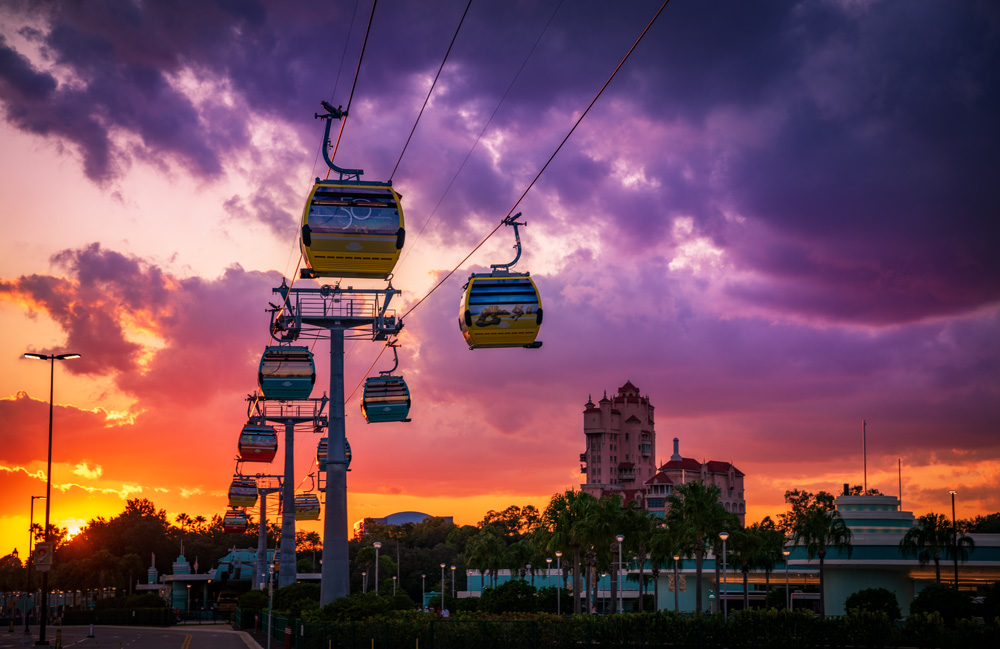
Along with the introduction of park specific pricing at Walt Disney World, the cost to add the Park Hopper (and other options) to your ticket also now varies by date.
As a general matter, Walt Disney World’s date-based ticket pricing system makes price increases very difficult to assess. This variable pricing obfuscates increases (by design), and it’s thus usually very difficult for us to say which dates did or did not increase, or by how much. Normally.
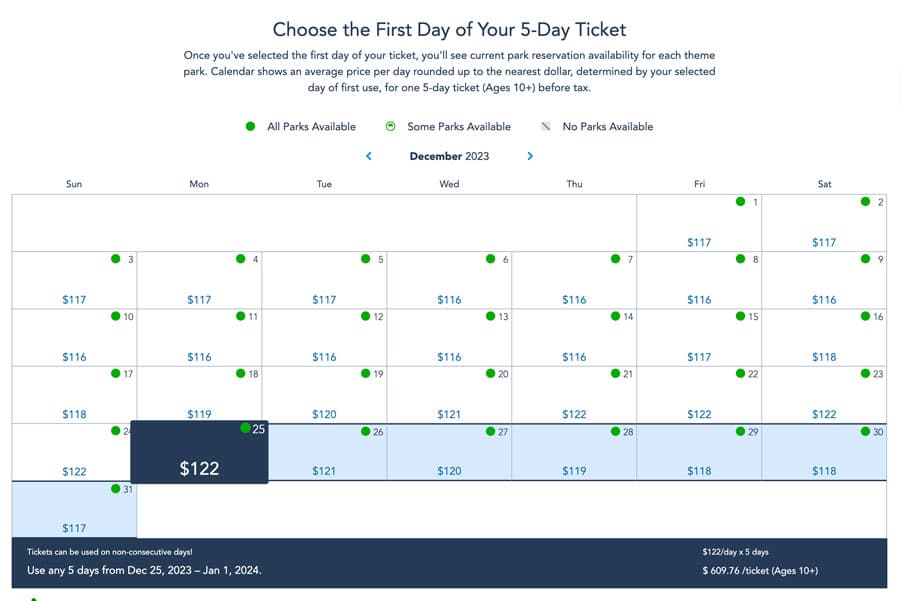
In this case, Walt Disney World telegraphed the price increase 3 weeks ago, so we had plenty of time to prepare, document old prices, and take screenshots of the date-based ticket calendar.
To that last point, above is a look at December 2023 pre-price increase v. post-price increase below.
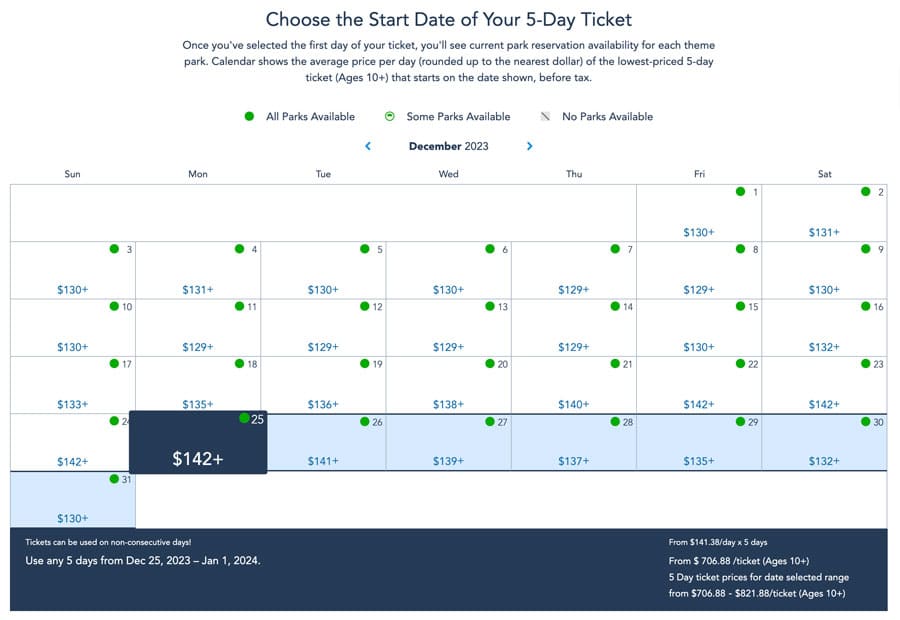
What you’re seeing via the above screenshots is 5-day standard tickets before and after the increase. It might be difficult to tell, but the pre-tax price increased by almost $100–from $609.76 to $706.88. (You can ignore the range on the second screenshot, that’s for the various Park Hopper options. Those have also gone up considerably, but that’s not the apples to apples comparison.)
Unfortunately, Disney once again outwitted me, changing the format of the calendar so it’s almost impossible to ascertain (at least, at a glance) how much Park Hopper and multi-day tickets have increased. Previously, you selected the Park Hopper option first and the calendar updated accordingly. Now, you choose your date first and only a starting price “+” is displayed. This further obfuscates the comparison.

From what I’ve been able to glean, price increases for Park Hopper and multi-day tickets are in the range of about 6% to 12%.
The actual amount varies considerably, and a comprehensive date-by-date breakdown is beyond the scope of this post. There are likely some off-season dates below 6%, but it would surprise me if anything exceeded 12%. I tried to keep tabs of the dates where I expected the biggest increases, and none of those are above 11.xx%.
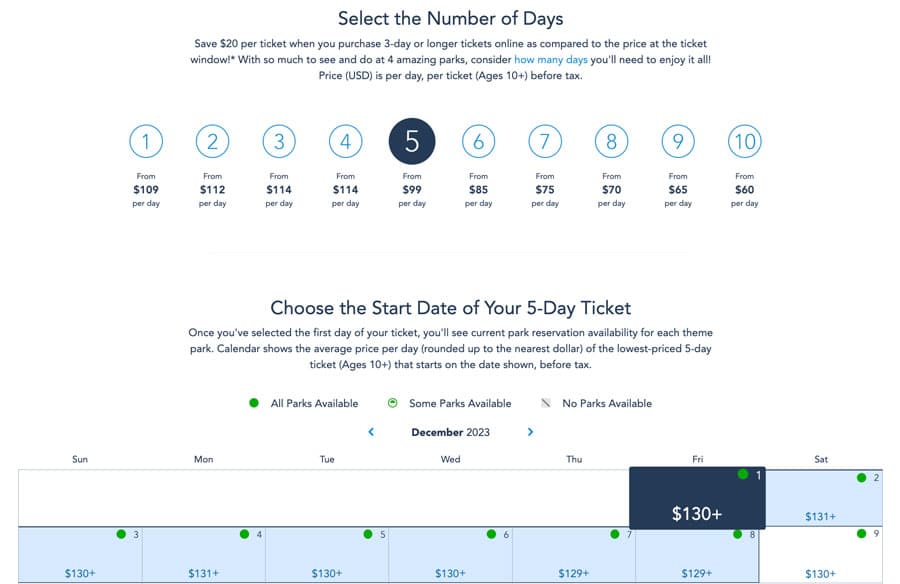
We also know that the base price for multi-day tickets has increased. Above are the new prices (e.g. from $99 per day for a 5-day ticket). While the 1-day price is the same as before–$109, but only at Animal Kingdom–everything else is up by $5 to $8 per day. The biggest increases are for the popular 4-day and 5-day tickets, which have increased by $8 per day. Again, these are the lowest prices in the date-based system.
In spot-checking, it appears to me that the biggest increases are for peak weeks–think Christmas and New Year’s Eve (this year and 2023), Presidents’ Day/Mardi Gras, Spring Break, Easter, Veterans’ Day, Thanksgiving, etc. It’s pretty much a given that these weeks would see larger dollar amount increases, especially the longer-duration tickets. Based on what I’m seeing, these are also seeing some of the largest percentage gains.
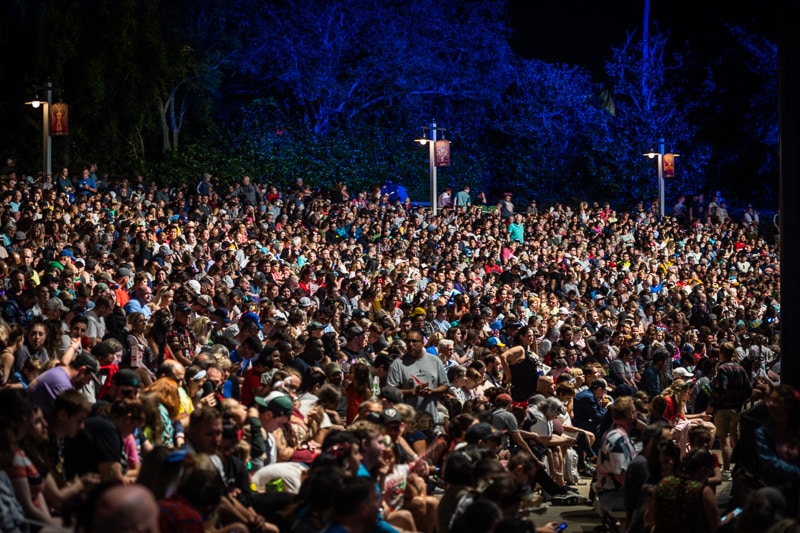
Not to beat a dead horse, but we discussed this exact phenomenon back in Disney Doesn’t Want Lower Crowds.
As we explain in that post, higher prices do not necessarily translate to lower attendance. There are certain times of year that experience higher demand due to school schedules, seasonal events, weather, etc. Teachers or families with school age children can’t switch their vacation from summer break to mid-September to take advantage of lower prices. That’s not a viable solution for Disney’s core demographic of guests. They will simply pay more to visit during school breaks. Despite feigning otherwise, Disney knows this.
Charging incrementally higher prices for these times of year allows Walt Disney World to capitalize on and profit from that inherently higher demand, which is relatively inelastic. That’s the ballgame. No matter how many times Disney might try to say so, the goal is not “flexibility” or whatever. This is the reason spring break, summer vacation, and fall/winter holidays continue to see heavier attendance than any other time of year and have not leveled off with random dates in mid-January, early May, late August, etc. Increasing prices on that quasi-captive audience is simply savvy business or opportunism, depending upon your perspective. But I digress.
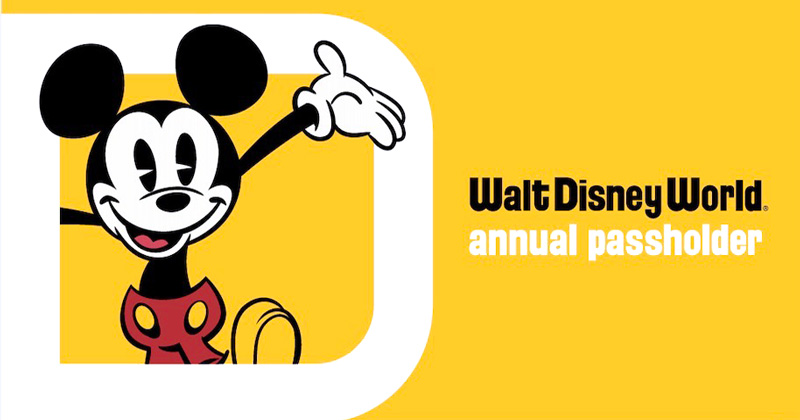
Similarly, although new Annual Pass sales remain paused, those APs will see an increase when sales resume. Here are the new prices for each tier:
- Incredi-Pass: $1399 – previously $1299
- Sorcerer Pass: $969 – previously $899
- Pirate Pass: $749 – previously $699
- Pixie Pass: $399 – no change
For those wondering when new AP sales will restart, Walt Disney World has no official answer–except that it won’t be this year. We cover our current expectations in When Will Walt Disney World Resume Annual Pass Sales in 2023?

When it comes to 2023 Walt Disney World vacation packages with park tickets, I’m not seeing any differences in before/after pricing.
This could be an oversight or error on my part. My ‘system’ for monitoring pricing is very rudimentary, so it’s entirely possible I’m missing something.
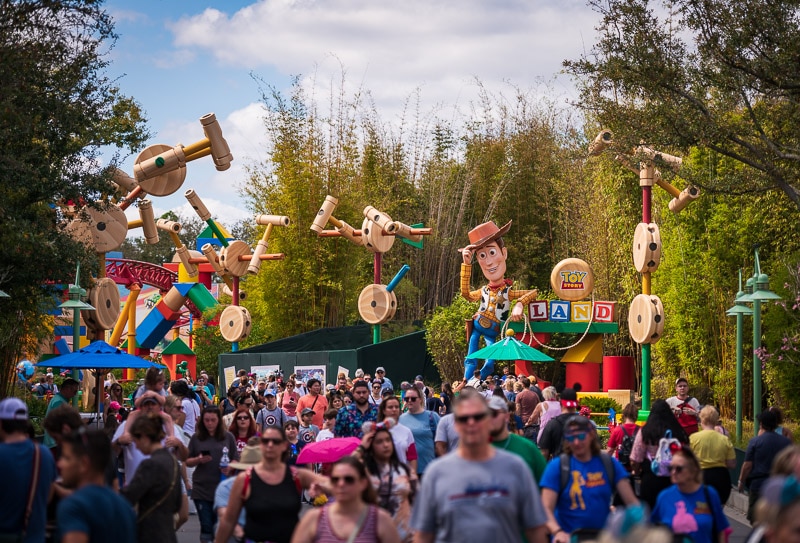
As for commentary about the price increases, the only “new material” I have here revolves around Disney’s Bob Swap. As noted above, this price increase and ticketing change was announced on November 15–before Chapek was fired and Iger was brought back. Given that this involves system changes, it was likely set in motion months ago and–if I had to guess–was originally slated to roll out with the other fiscal year increases in October.
In any case, Bob Iger indicated that he was “alarmed” by previous Walt Disney World price increases and layoff plans in leaks to media since returning. In that article, we questioned whether Iger would pause the previously-announced but not yet implemented ticket price increase slated for Walt Disney World in December 2022? Nope.
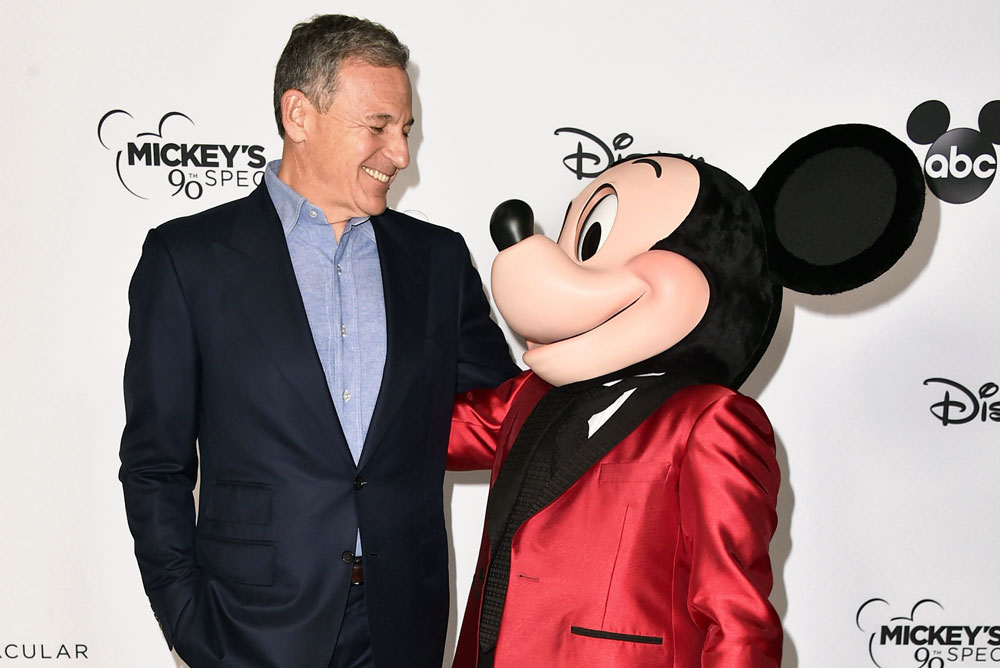
Honestly, this isn’t much of a surprise. Based on responses during his Town Hall last week, it was pretty clear that Iger was still playing catch-up and likely will be for a while. Moreover, as we discussed in 7 Good Changes Bob Iger Could Make to “Fix” Walt Disney World, it’s going to be very difficult to put the genie back in the bottle–both literally and figuratively–once the company gets a taste of higher prices. Especially when Walt Disney World raises costs but does not see a corresponding drop in demand.
Given that Iger was brought it to stem the bleeding from streaming and improve Disney’s financials, I have a difficult time believing that he is going to take the immediate hit on prices and the other upcharges just to improve goodwill among Walt Disney World fans. It’s very difficult to envision a way that Iger does that in the near-term given the uphill battle that Disney+ and Hulu face. Our hope has been that Iger improves the guest experience, the quality of the parks, and the value proposition for visiting. He’s almost certainly not going to do that by decreasing prices–that’s a fan fantasy–but by restoring elements of the magic. That’s the realistic best-case scenario.
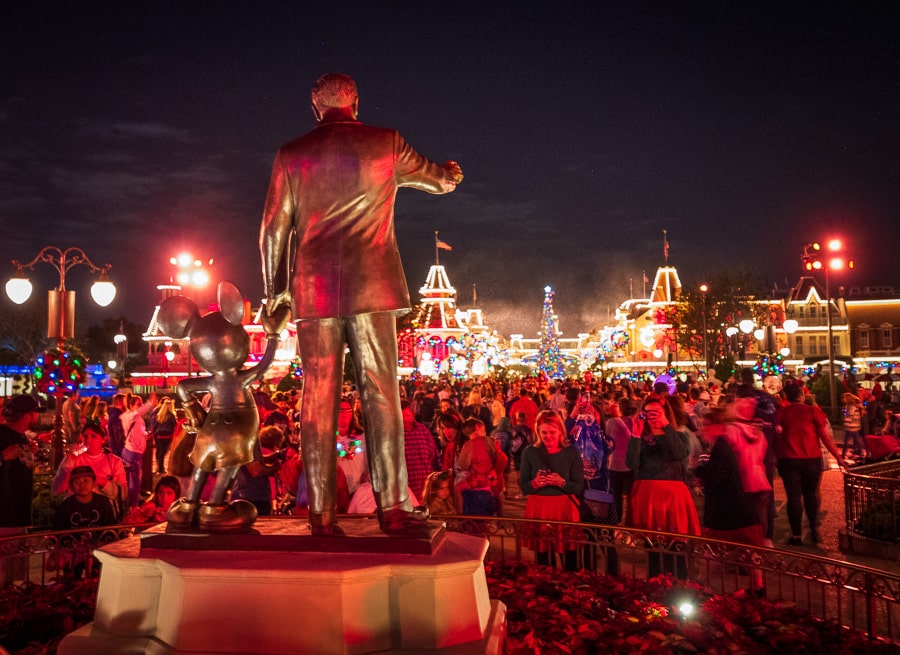
Beyond the Iger-related commentary, there’s nothing new to report here. As I’ve said several times this year, I’ve lost the capacity for surprise when it comes to price increases. Even though this is the second ticket price increase of the year at Walt Disney World, it’s still not a huge surprise. Crowds are crushing, pent-up demand is still strong, and the parks have a devoted and passionate fanbase.
The busy Christmas season has arrived and with it, the highest attendance month of the year. Last year, Christmas was such a popular season that Walt Disney World ran out of reservations even at top-tier prices and suspended ticket sales for some dates. Thus far, this holiday season has been slightly less busy than last year, but that could be a byproduct of restored capacity, rather than lower raw attendance numbers. (That would be our guess.)
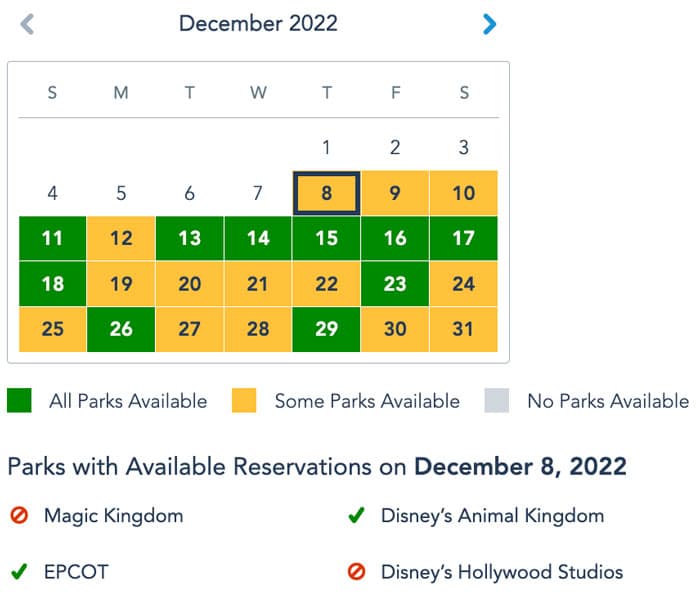
On a positive note, we are very pleased to see reservations rolled into 1-day tickets. This is a step in the right direction, and one we’re shocked didn’t happen at the start of this year. As mentioned above, we expect reservations to fade away for Park Hopper and multi-day tickets in early 2023, too. We’ve discussed the “why” of all this in When Will Park Pass Reservations End at Walt Disney World?
The argument could be made that reservations are useful when it comes to staffing or resource allocation, but that doesn’t really hold water with single day tickets—especially under this new system. We’re skeptical that it ever was true for any tickets, as Disney is notoriously bad with data and analytics, even if it might fancy itself a tech company now. Redistribution of attendance and yield management are upsides of the reservation system, and why it’s unlikely to ever go away for APs.

On top of that, inflation is running hot around the globe, with the United States hitting a four-decade high above 8% this year. Thankfully, this is starting to abate as consumer spending also starts to cool, but inflation does remain elevated. Most of these price increases are in the neighborhood that. On top of that, the least expensive single day tickets haven’t gone up since October 2018.
However, it’s also fair to point out that with the end of free FastPass+ and introduction of paid Genie+ and Lightning Lanes, which Disney has indicated that roughly half of Walt Disney World visitors are purchasing, the effective cost of visiting has gone up by more than 10%. In order to have an equivalent experience as compared to pre-closure, you’ll need to spend an extra $25 per day, at least, and that’s just for Lightning Lanes. That’s still not exactly apples to apples, but it’s close enough for the sake of our comparison.
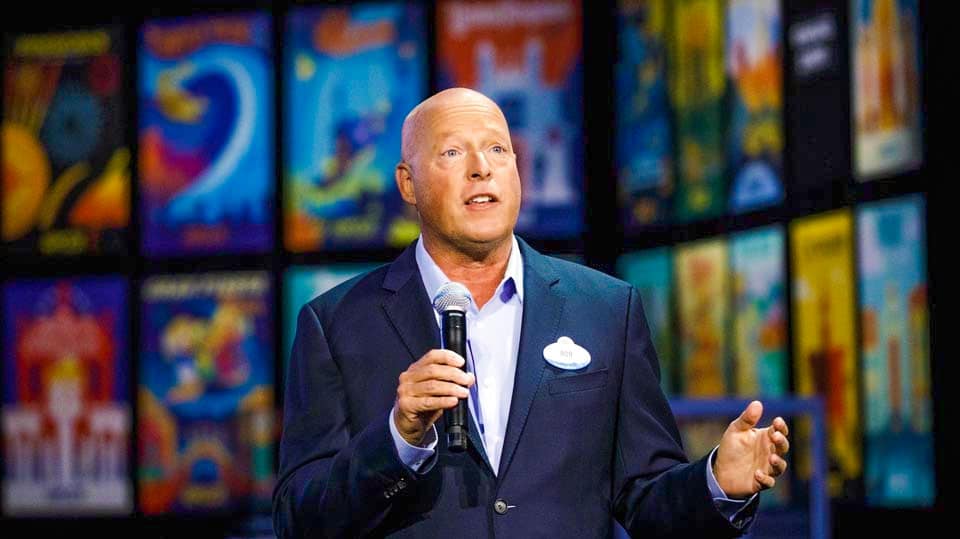
During earnings calls and interviews throughout the year, former CEO Bob Chapek directly addressed price increases–and prepared fans for more of the same. He has said that Disney’s theme parks are seeing unprecedented demand, and have pricing power as a result. He also boasted that the company’s domestic parks and resorts have achieved all-time revenue and operating income records.
For several consecutive quarters, per guest spending at the domestic parks has been up more than 40% versus the same quarter in 2019, an absolutely staggering number. This has been driven by a more favorable guest and ticket mix (read: fewer Annual Passholders), plus higher food & beverage and merchandise spending, as well as contributions from Genie+ and Lightning Lanes. Revenue and operating income exceeded pre-pandemic levels, and that’s even as Disney continued capping attendance.

In essence, corporate leadership has said that the ball is in consumers’ court—so long as they continue to descend upon Walt Disney World in huge numbers and willingly pay more, Disney will continue to raise prices until met with resistance. (In the form of lost sales and reduced demand, not online complaints divorced from actual action.)
At least in the short term, the company is correct about costs. It’s hard to make a compelling case that Walt Disney World has any sort of pricing problem, at least for now. Even with all of the recent (non-ticket) price increases, the company is posting unprecedented numbers and demand is off the charts. This is why all of the fans clamoring for price decreases now that Iger is back are setting themselves up for disappointment. Things will improve–that’s already happening with more on the horizon. But why would the company leave money on the table?
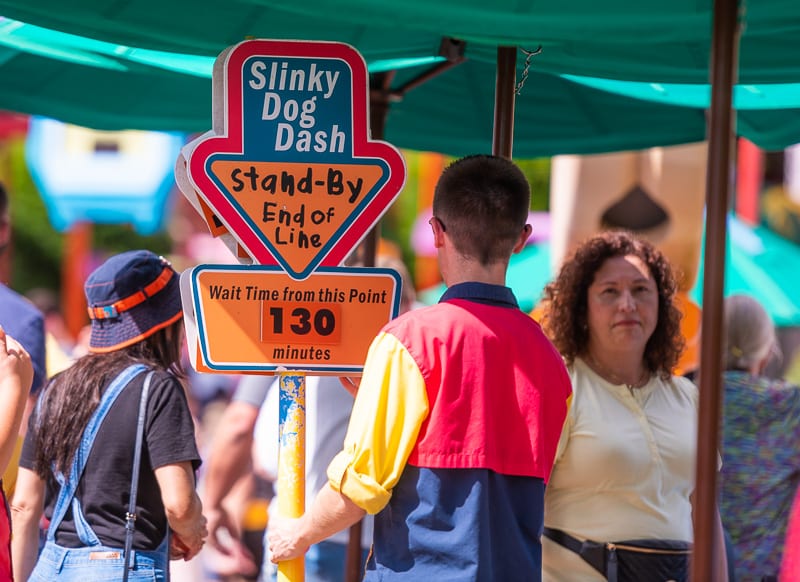
Walt Disney World crowds have been absolutely bonkers this year, with only a handful of exceptions. While the Florida parks haven’t hit Disneyland levels of absurdity, they are closing in on 2019 wait time levels (but almost certainly not raw attendance numbers due to the reduced capacity of the parks, which exacerbates “feels like” crowds).
In short, as long as consumers keep spending and pent-up demand is strong, people will pay the prices for Walt Disney World park tickets, Genie+ and Lightning Lanes, and whatever else has gone up in price. The serious issue will come down the road when people are not feeling so hot about their economic circumstances and future.
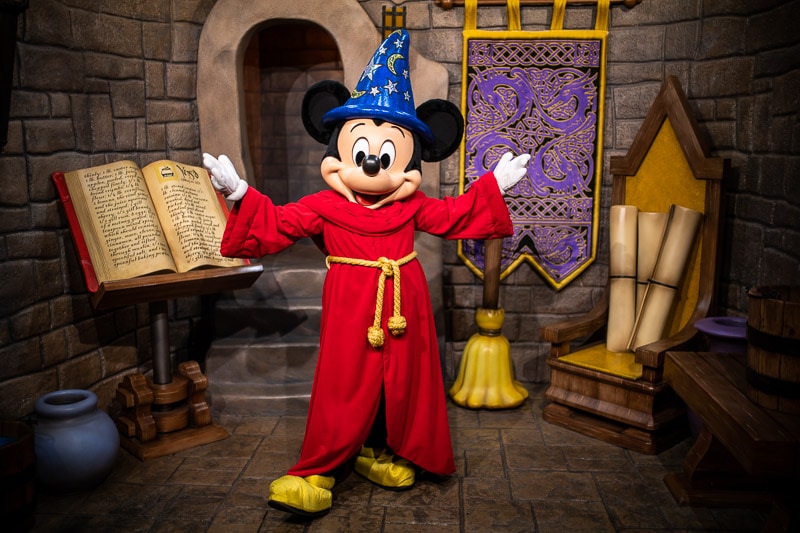
At that point, it’s a question of whether discounting will be enough to incentivize guests to return, or if irreparable brand damage will have been done during the last decade or so of increases. We don’t have an answer to that–no one does–but it’s definitely something about which we’re curious.
We aren’t alone. Wall Street analysts and investors have asked the company about contingency plans to keep the company on track to meet its financial targets during a potential recession in 2023. In response, Disney indicated that there are a number of “levers” they could pull in the event of economic downturn.
We explain those options in What Does Walt Disney World Do During a Recession? However, in the here and now, pent-up demand still has not exhausted itself. This holiday season might be the ‘last hurrah’ so to speak, but it’s likely to be a busy one.
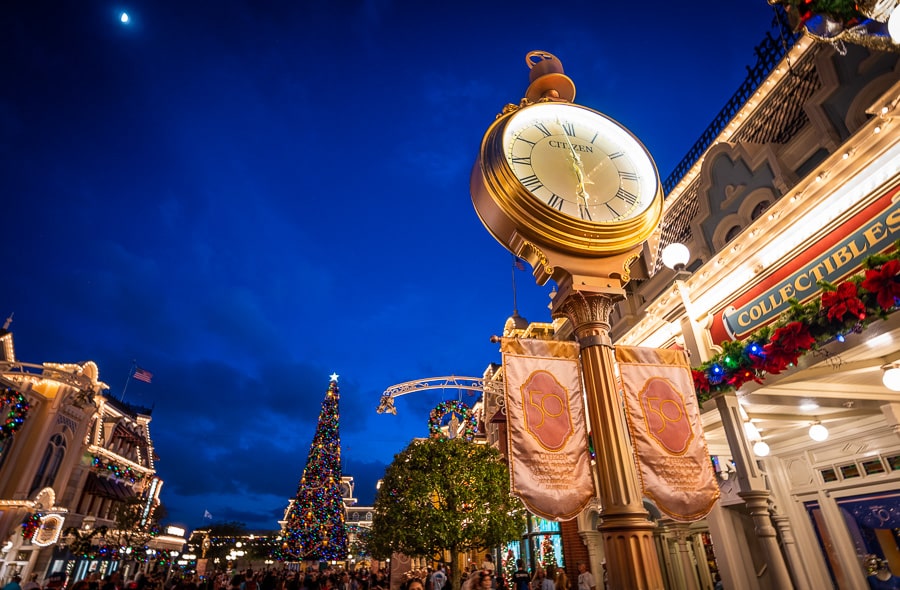
Ultimately, it’s still our belief that things aren’t too far from normalizing. (You might call it wishful–or delusional–thinking!) Again, this holiday season will certainly be busy and we’re not suggesting otherwise. However, these price increases and other changes last beyond Christmas. It’ll be interesting to see whether capturing extra revenue for another couple of months is worth the headlines that further cement Walt Disney World as a travel destination with ever-increasing prices.
It’ll also be interesting to see just how quickly Walt Disney World is able to pivot and pull some of those “levers” (to borrow a phrase from the c-suite) when attendance or the U.S. economy (or both) switches gears. At some point, pent-up demand will fizzle out and inflation on necessities will negatively discretionary spending; on top of that, higher interest rates, underperforming investment portfolios, and growing household debt will bring the party to an end. The clock is ticking on all of that.

When all of some of that happens, consumers will return to being more cost-conscious and price sensitive, and things will normalize to at least some degree. However, there don’t appear to be any signs of those things happening anytime soon. Perhaps by mid-2023, but even if there is a slowdown, it could take Disney a while to pivot on pricing.
In the meantime, get used to high prices, heavy crowds, and nickel & diming at Walt Disney World and Disneyland as this record run of revenue and income continues for at least the immediate future. We’ll be paying careful attention to all of the changes, and will keep you updated as we learn anything new.
Planning a Walt Disney World trip? Learn about hotels on our Walt Disney World Hotels Reviews page. For where to eat, read our Walt Disney World Restaurant Reviews. To save money on tickets or determine which type to buy, read our Tips for Saving Money on Walt Disney World Tickets post. Our What to Pack for Disney Trips post takes a unique look at clever items to take. For what to do and when to do it, our Walt Disney World Ride Guides will help. For comprehensive advice, the best place to start is our Walt Disney World Trip Planning Guide for everything you need to know!
YOUR THOUGHTS
Thoughts on the park ticket price increases? Any dates with before/after percentage jumps you see that are higher than 12%? What about package pricing? What do you think about Walt Disney World’s decision to change the park ticketing system and increase prices along with it? Do you think Disney is going too far with increases in a way that’ll leave lasting reputational damage, or will the company be able to quickly pivot along with economic circumstances? Agree or disagree with our assessment? Any other considerations we failed to take into account or details we missed? Any questions we can help you answer? Hearing your feedback–even when you disagree with us–is both interesting to us and helpful to other readers, so please share your thoughts below in the comments!

I have no statistics on this issue, but you have to consider just the population growth of the world in the last, as an example, 10 years. And consider the stagnant nature of the 4 parks, meaning no additional people eating attractions (and a decrease probably that was covid driven that still hasn’t recovered.)
Also, are there just more people who due to modern communication tools, more aware of the existence of Disney and able to travel there?
Is the explosion in attendance yearly simply a result of all of this and is Disney going to have an endless supply of humans to fill these parks and subsequently be able to continue just charging what they want?
It’s all of that. The growth of the global middle class in the last decade, millennials (a huge generation) have nostalgia for Disney and are now having kids–the list goes on and on.
we have a Nov 2023 Swan package. I can’t check for increase because it shows those dates unavailable. I only made a $200 payment. Am I price increase protected?
I’ve not been to DW since 2018. I have been to DL post-pandemic a couple of times on weekdays. It was a poor value experience each time. I went because my kids invited me. I used to love just being at the parks. Now, it is too stressful and crowded to enjoy after about noon. I am utterly baffled by the continued crowds given what I perceive as a poor use of vacation dollars. Obviously, an enormous population disagrees with my perception.
We have been going to Walt Disney World for over 25 years and are DVC owners, but I wonder with all the price increases in tickets, food, etc. is it worth going. In the past few years several items such as The Nighttime Parade at Magic Kingdom, Osborne Lights at Hollywood Studios, Dining plan, TiW cards, free FastPass or Fastpass+, Free Magic Express, etc. have all been slowly been done away with.
We really love going to WDW but are now like I am sure many other people are, considering other options.